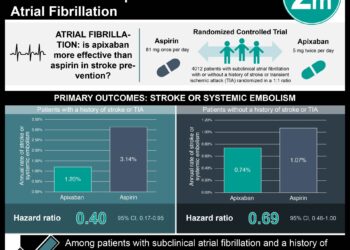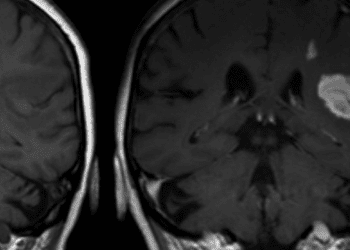Quick Take: Functional Outcome of Intravenous Thrombolysis in Patients With Lacunar Infarcts in the WAKE-UP Trial
Intravenous thrombolytic therapy with alteplase (recombinant human tissue plasminogen activator) is approved for the treatment of acute ischemic stroke. However, whether it is efficacious in the treatment of lacunar infarcts remains unclear. In this secondary post-hoc analysis of the WAKE-UP randomized controlled trial, 108 patients with acute lacunar stroke from the original study population of 503 patients with an acute stroke of unknown onset time were studied to determine the efficacy and safety of intravenous thrombolysis with alteplase as compared to placebo among patients with lacunar infarcts. The primary endpoint was a favorable outcome defined as a score of 0 or 1 point on the modified Rankin Scale (mRS) at 90 days after stroke, adjusted for age and severity of symptoms. Compared to patients with non-lacunar infarcts, patients with lacunar infarcts were more likely to be male (68.5% vs. 63.5%), younger (mean age 63 years vs. 66 years, p=0.003), and to have a lower median National Institutes of Health Stroke Scale (NIHSS) score on admission (5 vs. 6, p<0.001). In total, 55 of the 108 patients with a lacunar infarct (50.9%) were assigned to receive alteplase, and 49.1% were assigned to receive placebo. Among all 503 patients, alteplase treatment was associated with higher odds of favorable outcome, with no differences observed between lacunar infarcts and non-lacunar infarcts (OR 1.68 vs.1.62, respectively, test for interaction, p=0.94). In patients with lacunar stroke, there was no significant difference in the proportion of patients achieving a favorable outcome in the alteplase group as compared to the placebo group (59% vs. 46%, respectively, OR 1.67, 95% CI 0.77 to 3.64, p=0.20). At 90 days, there was a non-significant difference in outcomes based on the distribution of mRS scores at 90 days (OR 1.94, 95% CI 0.95 to 3.93, p=0.07). In terms of safety, there was 1 death and 1 symptomatic intracranial hemorrhage in the alteplase group; neither of these outcomes occurred in the placebo group. Importantly, the WAKE-UP trial was not powered to show a significant treatment outcome in patient subgroups. Nonetheless, this study does show that the association of intravenous alteplase with functional outcome does not differ in patients with lacunar infarcts as compared to those experiencing other stroke subtypes.
Click to read the study in JAMA Neurology
Image: PD
©2019 2 Minute Medicine, Inc. All rights reserved. No works may be reproduced without expressed written consent from 2 Minute Medicine, Inc. Inquire about licensing here. No article should be construed as medical advice and is not intended as such by the authors or by 2 Minute Medicine, Inc.







